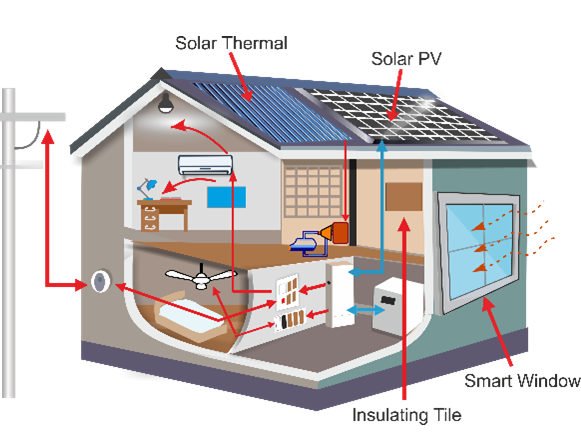About the center
Total energy consumption in India has doubled in a span of 10 years from 620 TWh in 2009 to 1200 TWh in 2019. At the COP26 climate conference in Glasgow (Nov 2021), Prime Minister Modi announced "Mission 500GW" with aims to take India's renewable energy (RE) capacity to 500GW by the year 2030. Since India's current RE capacity is about 101 GW (2021), we would need to add about 40 GW of RE capacity per year to meet the set goals. The mammoth challenge that we have in front of us can be realized by knowing that the current trajectory of India's RE sector is only about 8GW per year.
As renewable energy production is gaining the spotlight, silicon-based solar photovoltaics are receiving increasing attention as a potentially pervasive approach to sustainable energy generation. However, silicon-based solar cells fabrication is a very high energy-intensive and complex technology, which makes the solar modules costly.
The perovskite holds the upper hand over silicon technology for its solution-processed approach resulting in efficiency comparable to silicon cells while using cost effective and facile synthesis and fabrication technology. The ambient stability of the perovskite is the foremost hurdle for the commercialization and new strategies will be developed at the DST_IIT Kanpur center to enhance the stability and performance towards the commercialization of perovskite-based solar cells. India particularly has a high potential to integrate solar energy technology with the smart energy management system which will lead to reduced utilization of conventional energy. Therefore, one of the objectives of the center is to design and develop performance materials for solar thermal systems, and thermal tiles and smart windows for energy-efficient buildings. Such cost-effective and marketable building-integrable technology can leverage the entry of Indian industries into the respective market in line with the "Make in India", "Innovate in India" and "Atmanirbhar Bharat" initiatives of the central government.
The successful execution at DST-IIT Kanpur CRADMET center is envisaged to deliver critical information on the design and development of new and high-performance materials, solar cells, prototype coatings, smart windows, tiles and solar thermal components and a catalogue of potent materials and device components will be generated over the tenure of the project. Our team comprising of researchers from the IITs (Kanpur, Roorkee, Madras, Guwahati and Hyderabad), CSIR (IICT and NIIST), IIITDM, IISER Thiruvananthapuram, NIT Tiruchirappalli and ARCI Hyderabad, brings in expertise from various facets of energy harvesting and conservation including photovoltaics, solar thermal storage, materials synthesis and characterization, automation, computational materials science and machine learning into a unified synergistic working group. The proposed deliverables of the center can potentially be integrated with numerous clean energy technologies that can be immediately employed by industry, making it versatile in terms of national and global acceptance.



